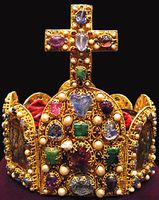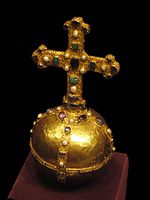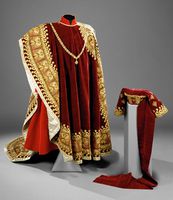Head of state (Batavia)
The King of Batavia is the head of state of the Kingdom of Batavia. When a female ascends the Throne, she receives the title Queen of Batavia. The King does not only serve as head of state but is the figurehead of the Batavian Catologian Church, the chairman of the Hogerhuis and supreme commander of the armed forces, the Bataafse Strijdkrachten.
Between 1578 AN and 1669 AN, the title of King of Batavians was used to refer to the King. This change of tradition began under Arkadius III, who - unlike his predecessors - sought popular support among the masses. This subtle hint was meant to show the people that he wasn't their master, but more as an equal (or even servant). In the end, it didn't help him when faced with a coup d'état, but his successors would keep the title. It was in 1669 AN, under Arkadius IV, that these changes were reverted with support on the nobility and high dignitaries.
Duties and priviliges
Regalia and crown jewels
On the day of the throne, the king or queen is dressed with the regalia and crown jewels:
- Willemian crown, as a symbol of the sovereignty of the Kingdom of Batavia and the dignity of the King as head of state. The crown forged on behalf of good King William the Second, which serves as a symbol of dignity.
- Globe, symbolises Royal power, both worldly as spiritually, as King over Micras and the Batavian Kingdom.
- Scepter, symbolises justice, and the King as highest shepherd and judge of the nation.
- Golden Fleece, a woolen robe made of the finest gold wire. It has been part of the regalia for many generations and was in the possession of the Royal Family which once ruled the Kingdom of 's Koningenwaarde, before it united the territories into one country. Made with the gold of the mines to the east of Bosdaal and fabricated by crafstmen from all across the country.
List of monarchs
Kings of 's Koningenwaarde
The Kings of 's Koningenwaarde preceded the birth of a strong and centralised Kingdom. While, from a certain moment, more or less uniting the Batavians into a framework of loose cooperation and loyalty to the Crown, there was no political unity.
Kings of Batavia
The several principalities, duchies and counties were eventually united in a centralised state under the leadership of the Regent Jodocus van Haltna. Batavia would transform from a union of States into a centralised monarchy. The First Kingdom would see the struggle between the absolutists (who sought to stop the parliament from taking to much power) and the more radical democrats. This would eventually led to the end of Arkadius I's short-lived reign and the ascension of his brother onto the Throne.
| No. | Portrait | Coat of arms | Regnal name | Dynasty | Birth day (in AN) | Reign (in AN) | Day of death (in AN) | Notes |
|---|---|---|---|---|---|---|---|---|
| 17 | 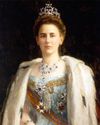
|
Faya I | House Veronique | 1462 | 1514 - 1520
(22 march 2006 - 4 september 2006) |
1520 | ||
| 18 | 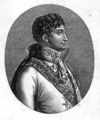
|

|
Arkadius I | House of Vinandy | 1502 | 1520 - 1523 / 1524
(4 september 2006 - 2 december 2006) |
1565 | Became suddenly ill and despite good care, he died on 7 Zomermaand 1565 AN. |
| - | 
|
Sede vacante | 1523 - 1524
(2 december 2006 - 4 january 2007) |
See: Davignonrepublic | ||||
| 19 | 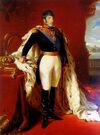
|
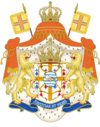
|
Arkadius II | House of Vinandy | 1506 | 1524 - 1567
(4 january 2007 - 18 august 2010) |
1567 | |
| - | 
|
First regency of Jeroen van Veen | 1567 - 1568
(18 august - 13 september 2010) |
|||||
| 20 | 
|

|
Fränzi-Ferdinanda I | House of Vinandy-Windsor | 1552 | 1568 - 1577
(13 september 2010 - 18 june 2011) |
1577 | Abdicated in favor of Antonius Frederik Karel (Arkadius III des Vinandy). |
| - | 
|
Second regency of Jeroen van Veen | 1577 - 1578
(18 june - 6 july 2011) |
|||||
| 21 | 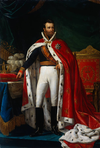
|

|
Arkadius III | House of Vinandy | 1552 | 1578 - 1582 / 1585
(6 july 2011 - 12 november 2011) |
1634 | Not all sources refer to the end of his reign with the same year: some recognise 1582 AN, when Arkadius stepped down under pressure of the armed forces, while others recognise the adoption of a new constitution and the ascension of Mordechai I as official date. |
| 22 | 
|

|
Mordechai I | House Erasmus | 1585 - 1588 | |||
| 23 | 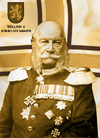
|
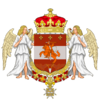
|
Willem V | House of Vinandy-Windsor | 1576 | 1588 - 1592 | 1592 | |
| 24 | 
|
File:WapenBunthe-une.png | Maximiliaan I | House van Bunthe-Uné | 1592 - 1594 | |||
| 25 | 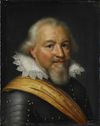
|

|
Hendrik I | House of Vinandy | 1576 | 1594 - 1600 | 1603 | |
| 26 | File:Sisera I.png | 
|
Sisera I | House Erasmus | 1600 - 1602 | |||
| 27 | 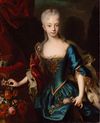
|

|
Anna III | House of Vinandy-Windsor | 1602 - 1614 | |||
| 28 | File:Simon II.png | 
|
Simon I | House Erasmus | 1614 - 1623 | First Heavenly Light of Jingdao who claimed and combined the title of King of Batavians with his emperorship. Start of the Jingdaoese-Batavian Kings. | ||
| 29 | File:Sisera II.png | 
|
Sisera II | House Erasmus | 1623 - 1627 | |||
| 30 | File:Mordechai II.png | 
|
Mordechai II | House Erasmus | 1627 - 1631 | |||
| 31 | File:Gradus II.png | 
|
Gradus I | House Erasmus | 1631 - 1634 | |||
| 32 | 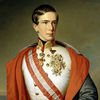
|

|
Heinrich I | House Erasmus | 1631 - 1636 | |||
| 33 | File:Simon II.png | 
|
Simon II | House Erasmus | 1636 - 1640 | |||
| 34 | 
|
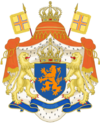
|
Arkadius IV | House of Vinandy | 1642 | 1669 - present |

